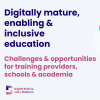i-Learn - Belgium
The i-Learn project was commissioned by the Flemish government of Belgian, and implemented together with a range of public and private partners: imec, KU Leuven and itec all participated in the endeavour. The initiative was organised with the support of Brightlab and IDLab and ran between September 2019 to June 2023. Funding was provided by VLAIO (Flanders Innovation & Entrepreneurship), a regional public research and innovation agency that supports companies in Flanders to innovate through grants.
About this initiative
The i-Learn project aimed to improve diversity ratios in primary and secondary schools and raise awareness of the different learning needs students in a rapidly-evolving digital society may have. This is how the online portal MyWay was launched - an integrative platform with a wide range of educational applications from various training providers, which facilitates personalised learning. The focus is not just on providing the tools per se, but also on supporting teachers throughout this process, through coaching and training sessions via the i-Learn Academy (integrated in the platform to support teachers, school administrators and ICT coordinators).
The MyWay portal was developed in close collaboration with schools and teachers in the Flemish region of Belgium and launched to the public in 2021, following a successful pilot phase in 12 Flemish schools in 2020 and 2021. The MyWay classroom portal makes tailored digital learning journeys possible via 40+ free and 5 paid educational resources. In addition, the project developed 5 i-learn papers on best practices in designing online platforms for educational purposes and insights from the background research of the project. Finally, an entire collection of research resources on digital personalised learning is also available.
How it works
Schools have the flexibility to choose the extent to which they want to integrate the i-Learn framework within their curricula: they can use it in specific classes, grades, or school-wide. Teachers can also track student progress via a special, user-friendly dashboard, which simplifies and visualises results, thus helping to identify problem areas. It also gives a clear overview of each student's learning journey and how they are progressing compared to others. Students have personalised learning tracks at their disposal, and can work with teachers in designing new paths, or adapt pre-made tracks to reflect evolving goals.
The i-Learn Academy, available to teachers and ICT coordinators, as well as the wider school administration, provides a range of self-paced training modules and instructional videos. Teachers also have the opportunity to engage in in-person or virtual collaboration sessions, enrol in customised coaching programmes, and share knowledge through the platform community, which facilitates networking, collaboration, and innovation amongst educators.
Why is this a good practice?
The i-Learn project is a good example of an impactful initiative that addresses the shortage of digital skills in education - targeting students, teachers, and the wider school community. The project's focus on personalised learning makes it relevant in the context of evolving student needs in the digital age and reflects a sound understanding of the digital education landscape in Belgium. Guidance and support offered to teachers in the form of various resources, coaching sessions, and e-learning modules offers an opportunity to develop the skills and attitudes to adapt teaching methods so they can reflect student goals. The collaborative nature of the academy has resulted in an improved sense of community amongst educators, supporting exchange of knowledge and good practices, and cultivating a culture of innovation.
The project scores high in accessibility, with resources available for free, and log-in required only for more advanced users of the i-Learn platform. The model for the project is also highly replicable: while the approach was developed with primary and secondary schools in mind, it holds a high potential to be replicated in other education level, such as higher education or vocational training. It can also function as a model for policymakers and education institutions in Europe and beyond, for other projects that aim to address diverse learning goals and personalised education initiatives.
Find out more about the i-Learn project and its resources here.




